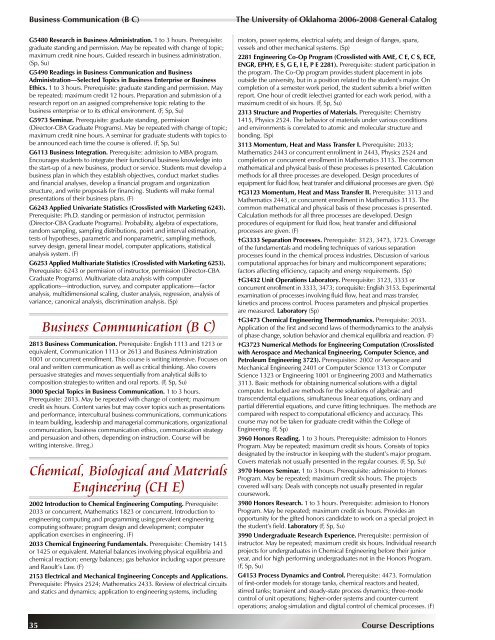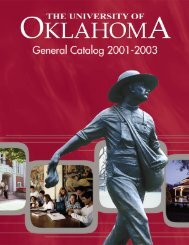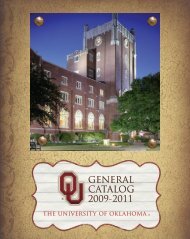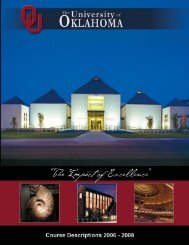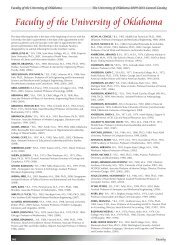2006-08 Course Descriptions - Catalog - University of Oklahoma
2006-08 Course Descriptions - Catalog - University of Oklahoma
2006-08 Course Descriptions - Catalog - University of Oklahoma
Create successful ePaper yourself
Turn your PDF publications into a flip-book with our unique Google optimized e-Paper software.
Business Communication (B C)The Uni ver sity <strong>of</strong> <strong>Oklahoma</strong> <strong>2006</strong>-20<strong>08</strong> Gen eral Cat a logG5480 Research in Business Administration. 1 to 3 hours. Prerequisite:graduate standing and permission. May be repeated with change <strong>of</strong> topic;maximum credit nine hours. Guided research in business administration.(Sp, Su)G5490 Readings in Business Communication and BusinessAdministration—Selected Topics in Business Enterprise or BusinessEthics. 1 to 3 hours. Prerequisite: graduate standing and permission. Maybe repeated; maximum credit 12 hours. Preparation and submission <strong>of</strong> aresearch report on an assigned comprehensive topic relating to thebusiness enterprise or to its ethical environment. (F, Sp, Su)G5973 Seminar. Prerequisite: graduate standing, permission(Director-CBA Graduate Programs). May be repeated with change <strong>of</strong> topic;maximum credit nine hours. A seminar for graduate students with topics tobe announced each time the course is <strong>of</strong>fered. (F, Sp, Su)G6113 Business Integration. Prerequisite: admission to MBA program.Encourages students to integrate their functional business knowledge intothe start-up <strong>of</strong> a new business, product or service. Students must develop abusiness plan in which they establish objectives, conduct market studiesand financial analyses, develop a financial program and organizationstructure, and write proposals for financing. Students will make formalpresentations <strong>of</strong> their business plans. (F)G6243 Applied Univariate Statistics (Crosslisted with Marketing 6243).Prerequisite: Ph.D. standing or permission <strong>of</strong> instructor, permission(Director-CBA Graduate Programs). Probability, algebra <strong>of</strong> expectations,random sampling, sampling distributions, point and interval estimation,tests <strong>of</strong> hypotheses, parametric and nonparametric, sampling methods,survey design, general linear model, computer applications, statisticalanalysis system. (F)G6253 Applied Multivariate Statistics (Crosslisted with Marketing 6253).Prerequisite: 6243 or permission <strong>of</strong> instructor, permission (Director-CBAGraduate Programs). Multivariate data analysis with computerapplications—introduction, survey, and computer applications—factoranalysis, multidimensional scaling, cluster analysis, regression, analysis <strong>of</strong>variance, canonical analysis, discrimination analysis. (Sp)Business Communication (B C)2813 Business Communication. Prerequisite: English 1113 and 1213 orequivalent, Communication 1113 or 2613 and Business Administration1001 or concurrent enrollment. This course is writing intensive. Focuses onoral and written communication as well as critical thinking. Also coverspersuasive strategies and moves sequentially from analytical skills tocomposition strategies to written and oral reports. (F, Sp, Su)3000 Special Topics in Business Communication. 1 to 3 hours.Prerequisite: 2813. May be repeated with change <strong>of</strong> content; maximumcredit six hours. Content varies but may cover topics such as presentationsand performance, intercultural business communications, communicationsin team building, leadership and managerial communications, organizationalcommunication, business communication ethics, communication strategyand persuasion and others, depending on instruction. <strong>Course</strong> will bewriting intensive. (Irreg.)Chemical, Biological and MaterialsEngineering (CH E)2002 Introduction to Chemical Engineering Computing. Prerequisite:2033 or concurrent, Mathematics 1823 or concurrent. Introduction toengineering computing and programming using prevalent engineeringcomputing s<strong>of</strong>tware; program design and development; computerapplication exercises in engineering. (F)2033 Chemical Engineering Fundamentals. Prerequisite: Chemistry 1415or 1425 or equivalent. Material balances involving physical equilibria andchemical reaction; energy balances; gas behavior including vapor pressureand Raoult’s Law. (F)2153 Electrical and Mechanical Engineering Concepts and Applications.Prerequisite: Physics 2524; Mathematics 2433. Review <strong>of</strong> electrical circuitsand statics and dynamics; application to engineering systems, includingmotors, power systems, electrical safety, and design <strong>of</strong> flanges, spans,vessels and other mechanical systems. (Sp)2281 Engineering Co-Op Program (Crosslisted with AME, C E, C S, ECE,ENGR, EPHY, E S, G E, I E, P E 2281). Prerequisite: student participation inthe program. The Co-Op program provides student placement in jobsoutside the university, but in a position related to the student’s major. Oncompletion <strong>of</strong> a semester work period, the student submits a brief writtenreport. One hour <strong>of</strong> credit (elective) granted for each work period, with amaximum credit <strong>of</strong> six hours. (F, Sp, Su)2313 Structure and Properties <strong>of</strong> Materials. Prerequisite: Chemistry1415, Physics 2524. The behavior <strong>of</strong> materials under various conditionsand environments is correlated to atomic and molecular structure andbonding. (Sp)3113 Momentum, Heat and Mass Transfer I. Prerequisite: 2033;Mathematics 2443 or concurrent enrollment in 2443, Physics 2524 andcompletion or concurrent enrollment in Mathematics 3113. The commonmathematical and physical basis <strong>of</strong> these processes is presented. Calculationmethods for all three processes are developed. Design procedures <strong>of</strong>equipment for fluid flow, heat transfer and diffusional processes are given. (Sp)†G3123 Momentum, Heat and Mass Transfer II. Prerequisite: 3113 andMathematics 2443, or concurrent enrollment in Mathematics 3113. Thecommon mathematical and physical basis <strong>of</strong> these processes is presented.Calculation methods for all three processes are developed. Designprocedures <strong>of</strong> equipment for fluid flow, heat transfer and diffusionalprocesses are given. (F)†G3333 Separation Processes. Prerequisite: 3123, 3473, 3723. Coverage<strong>of</strong> the fundamentals and modeling techniques <strong>of</strong> various separationprocesses found in the chemical process industries. Discussion <strong>of</strong> variouscomputational approaches for binary and multicomponent separations;factors affecting efficiency, capacity and energy requirements. (Sp)†G3432 Unit Operations Laboratory. Prerequisite: 3123, 3333 orconcurrent enrollment in 3333, 3473; corequisite: English 3153. Experimentalexamination <strong>of</strong> processes involving fluid flow, heat and mass transfer,kinetics and process control. Process parameters and physical propertiesare measured. Laboratory (Sp)†G3473 Chemical Engineering Thermodynamics. Prerequisite: 2033.Application <strong>of</strong> the first and second laws <strong>of</strong> thermodynamics to the analysis<strong>of</strong> phase change, solution behavior and chemical equilibria and reaction. (F)†G3723 Numerical Methods for Engineering Computation (Crosslistedwith Aerospace and Mechanical Engineering, Computer Science, andPetroleum Engineering 3723). Prerequisites: 2002 or Aerospace andMechanical Engineering 2401 or Computer Science 1313 or ComputerScience 1323 or Engineering 1001 or Engineering 2003 and Mathematics3113. Basic methods for obtaining numerical solutions with a digitalcomputer. Included are methods for the solutions <strong>of</strong> algebraic andtranscendental equations, simultaneous linear equations, ordinary andpartial differential equations, and curve fitting techniques. The methods arecompared with respect to computational efficiency and accuracy. Thiscourse may not be taken for graduate credit within the College <strong>of</strong>Engineering. (F, Sp)3960 Honors Reading. 1 to 3 hours. Prerequisite: admission to HonorsProgram. May be repeated; maximum credit six hours. Consists <strong>of</strong> topicsdesignated by the instructor in keeping with the student’s major program.Covers materials not usually presented in the regular courses. (F, Sp, Su)3970 Honors Seminar. 1 to 3 hours. Prerequisite: admission to HonorsProgram. May be repeated; maximum credit six hours. The projectscovered will vary. Deals with concepts not usually presented in regularcoursework.3980 Honors Research. 1 to 3 hours. Prerequisite: admission to HonorsProgram. May be repeated; maximum credit six hours. Provides anopportunity for the gifted honors candidate to work on a special project inthe student’s field. Laboratory (F, Sp, Su)3990 Undergraduate Research Experience. Prerequisite: permission <strong>of</strong>instructor. May be repeated; maximum credit six hours. Individual researchprojects for undergraduates in Chemical Engineering before their junioryear, and for high performing undergraduates not in the Honors Program.(F, Sp, Su)G4153 Process Dynamics and Control. Prerequisite: 4473. Formulation<strong>of</strong> first-order models for storage tanks, chemical reactors and heated,stirred tanks; transient and steady-state process dynamics; three-modecontrol <strong>of</strong> unit operations; higher-order systems and counter-currentoperations; analog simulation and digital control <strong>of</strong> chemical processes. (F)35 <strong>Course</strong> <strong>Descriptions</strong>


